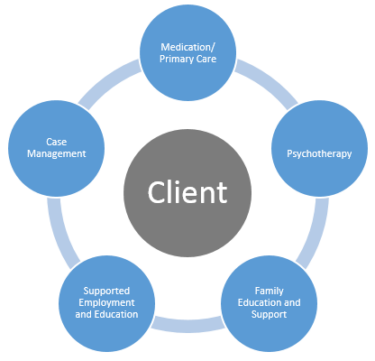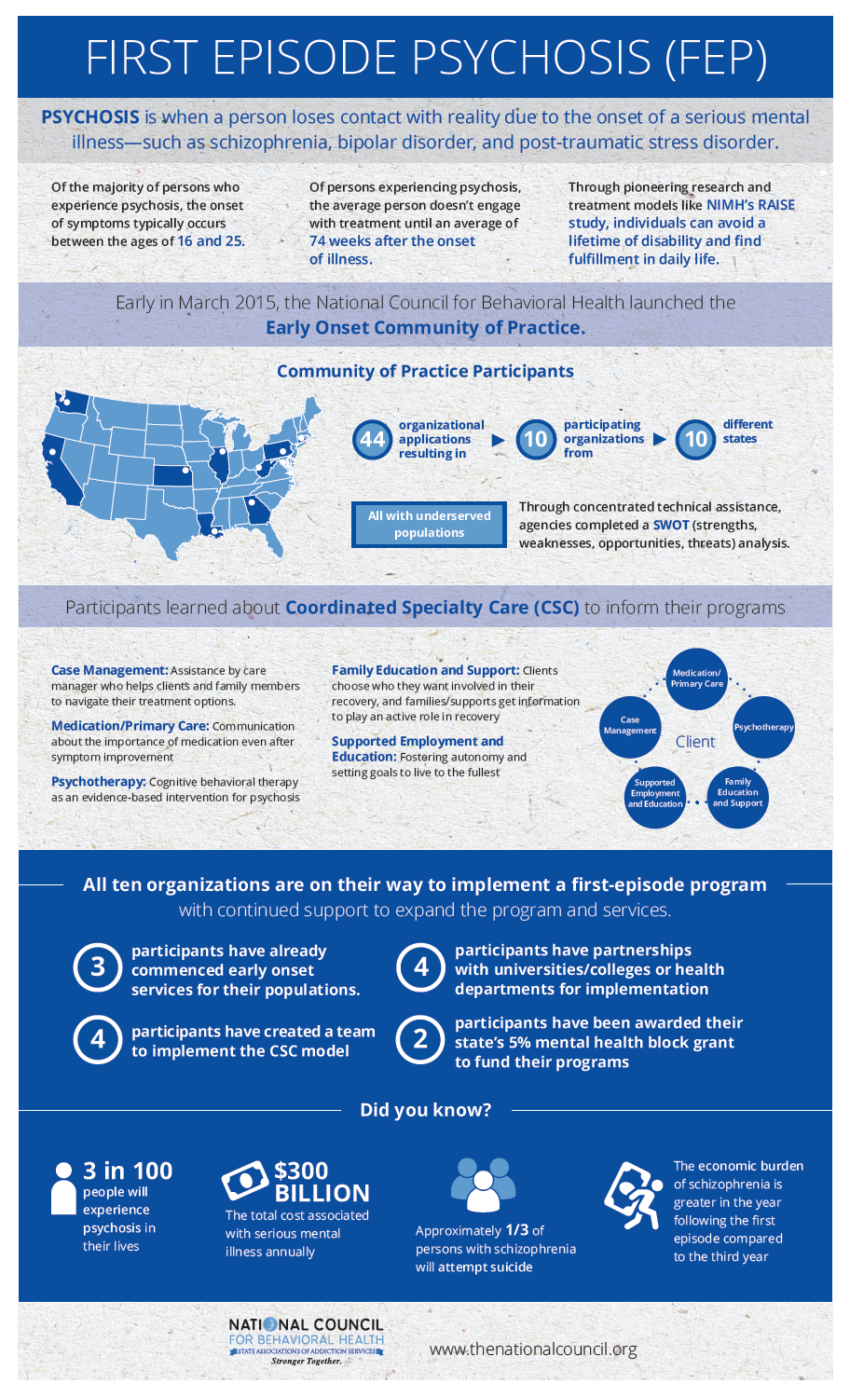First Episode Psychosis Community of Practice
The National Council for Mental Wellbeing is launching the Mental Health First Aid First Episode Psychosis Community of Practice to facilitate earlier interventions and improve outcomes for First Episode Psychosis (FEP).
Selected instructors will participate in a Mental Health First Aid FEP curriculum insert orientation. Instructors will then host a pilot training among community stakeholders and receive six-months of training and technical assistance.
What is psychosis?
Psychosis is a term used to describe symptoms of the onset of a serious mental illness (such as bipolar disorder, post-traumatic stress disorder or schizophrenia). According to the Substance Abuse and Mental Health Services Administration, most mental health clinicians find that individuals with first episode psychosis experience warning signs of illness during adolescence and early adulthood. Yet, of the majority of persons diagnosed with serious mental illness who exhibit symptoms between the ages of 16 and 25, only about 50 percent of those individuals obtain any type of diagnosis, referral or treatment. The lack of early treatment interventions available for persons that experience psychosis often leads to individuals living with a lifetime of disability. Through the promise of early intervention for psychosis treatments, individuals with psychosis are much more able to live healthy and productive lives—at school, at work, and at home.
What is early intervention in the treatment of psychosis?
Like other chronic health conditions, the sooner symptoms are identified and a treatment program is put into action, the more likely it is for a patient’s overall condition and health status to improve. In 2008, the National Institute of Mental Health launched the Recovery After an Initial Schizophrenia Episode (RAISE) project. RAISE was a large-scale research initiative that examined different aspects of coordinated specialty care treatments for people who were experiencing first episode psychosis.
In January 2014, after publication of RAISE research on the effectiveness of treatment of schizophrenia, Congress increased federal investment for the development of psychosis treatment services, creating opportunities to implement new treatments for youth and young adults experiencing an early onset psychosis around the country.
Why is it important to treat psychosis early?
The research produced by the National Institute for Mental Health demonstrated that coordinated specialty care treatments and supports can help prevent the full-onset of illness for high-risk persons and improve the long-term outcomes for individuals who have already experienced a first episode of psychosis. These developments are significant as the economic costs resulting from schizophrenia alone are between $32.5 and $65 billion annually.

The coordinated specialty care treatment model has been proven effective by providing high-intensity services for patients in need. More specifically, coordinated specialty care programs function with five key provisions:
- Case Management: Person-centered care, assisted by a care manager who helps clients and family members to navigate among treatment options.
- Medication/Primary Care: Communication about the importance of medication and potential value even after symptom improvement is critical in early discussion.
- Psychotherapy: Cognitive behavioral therapy as an evidence-based intervention for psychosis.
- Family Education and Support: Family psychoeducation so that consumers choose the support people they want involved in their recovery, and families/supports get information that helps them play an active role in the recovery process.
- Supported Employment and Education: Fostering autonomy and setting goals, including returning to school or work, developing new interests, meeting new people, and making new friends.
What do the statistics say about early intervention for psychosis treatment programs?
NAVIGATE: Resulting from the RAISE Early Treatment Program, NAVIGATE is a comprehensive, multidisciplinary, team-based treatment approach for first-episode psychosis that has been successfully implemented at 20 sites throughout the U.S. According to the October 2015 American Journal of Psychiatry, the 223 original NAVIGATE patients remained in treatment longer, experienced greater improvement in quality of life and psychopathology, and experienced greater involvement in work and school when compared to the 181 participants in community care, or traditional care for people with schizophrenia.
Prevention and Recovery in Early Psychosis (PREP): Since its inception in California, PREP has provided rigorous diagnostic and/or referral services to 842 individuals and their families, and provided treatment to 482 of those individuals. PREP participants have 50% fewer hospitalizations and demonstrate significant reductions in schizophrenia symptoms and levels of depression. 64% of participants are able to maintain or improve their functional capacity, demonstrated by increases in employment, school participation, and volunteering. These reductions saved participating counties an estimated $15,450 per participant year.
Early Assessment & Support Alliance (EASA): EASA serves teenagers and young adults with early symptoms consistent with schizophrenia and related conditions. EASA reaches over 94 percent of the population, has served over 1,500 individuals since 2001 and currently serves over 400 individuals and families per year. Data shows:
- During the first three months of the program, participants’ hospitalizations are consistently reduced and continue to decrease over time.
- 91% of participants maintain active family involved while in treatment.
- 5% of participants were not planning to apply for public assistance through the disability system after 12 months in the program.
What is the National Council doing to help member organizations implement coordinated specialty care treatments?
In 2015, the National Council launched the eight-month Early Onset Schizophrenia Community of Practice (CoP) which focused on making information about the clinical, workforce, training and financing elements necessary for successful adoption of early intervention models of care for the treatment of psychosis. The following organizations participated in the 2015 CoP:
- DC Department of Behavioral Health — Washington, DC
- Dekalb Community Service Board — Decatur, GA
- InterCommunity, Inc. — East Hartford, CT
- Johnson County Mental Health Center — Olathe, KS
- Metropolitan Human Services District — New Orleans, LA
- Safe Harbor Behavioral Health — Erie, PA
- Thresholds — Chicago, IL
- Turning Point Community Programs — Sacramento, CA
- Washington Community Mental Health Council — Seattle, WA
- Westbrook Health Services, Inc. — Parkersburg, WV
As a result of the CoP’s content, several participating agencies made significant changes to their current services structures to better facilitate care for persons with early onset psychosis including:
- 3 agencies commenced early intervention for psychosis services within their communities.
- 4 agencies created specialized teams to implement coordinate specialty care treatment model.
- 4 agencies created partnerships with universities/colleges or health departments for implementation.
- 2 agencies made full use of the 5% set aside Mental Health Block Grant to fund their programs.
Below are links to each of the PowerPoint presentation slides that were shared as part of the Early Onset Schizophrenia CoP:
In 2015, the National Council launched the eight-month Early Onset Schizophrenia Community of Practice (CoP) which focused on making information about the clinical, workforce, training and financing elements necessary for successful adoption of early intervention models of care for the treatment of psychosis. Below are links to each of the PowerPoint presentation…
Additionally, following the success of the Early Onset Psychosis track at NATCON15, the National Council hosted the Early Intervention for Psychosis track for NATCON16. Attendees were joined by premier researchers, practitioners and policy leaders to learn the latest interventions, practice changes, financing strategies, and partnerships to build and maintain a successful FEP program.
Additional resources:
National Council LIVE Webinars
National Institute for Mental Health
- Manual I: Outreach and Recruitment: summarizes key concepts, principles, and processes involved in community outreach and developing and maintaining referral networks. The manual includes sample brochures, contact forms, screening packets, and an overview of how to establish outreach and referral tracking system.
- Manual II: Implementation: provides a concise overview of administrative, training, and supervision activities needed to start an FEP treatment program. The manual provides a ‘Getting Started Checklist,’ sample program inclusion/exclusion criteria, job descriptions, resources/references for background reading, and discussion of how to monitor program fidelity.
Centers for Medicare and Medicaid Services
National Association of State Mental Health Program Directors Early Intervention in Psychosis Virtual Resource Center
- Steps and Decision Points in Starting an Early Psychosis Program
- Information for Policy Makers
- Building upon Existing Programs and Services to Meet the Needs of Persons with First Episode Psychosis
- Implementation of Coordinated Specialty Services for First Episode Psychosis in Rural and Frontier Communities
- Inventory and Environmental Scan of Evidence Based Practices for Treating Persons in Early Stages of Serious Mental Disorders
News and journal articles about early intervention for the treatment of psychosis:
- Children’s Mental Health Network, April 13, 2016: In Our Own Words, Sounds and Visions: EASA Young Adult Leadership Council: The Young Adult Leadership Council (YALC) of Oregon’s Early Assessment and Support Alliance’s (EASA) first film project is a direct look into psychosis through the music, art and experiences of YALC members.
- National Institutes of Health, February 1, 2016: “Team-based Treatment for First Episode Psychosis Found to be High Value”
- New York Times, December 28, 2015: “Programs Expand Schizophrenic Patients’ Role in Their Own Care”
- New York Times, October 20, 2015: “New Approach Advised to Treat Schizophrenia”
- Washington Post, October 20, 2015: “Study Suggests New Way To Treat People After First Schizophrenia Episode”
- Huffington Post, October 15, 2015: “Stop the Madness”
- Informational YouTube video from Janssen Pharmaceuticals, October 7, 2015: Early Intervention In Schizophrenia

